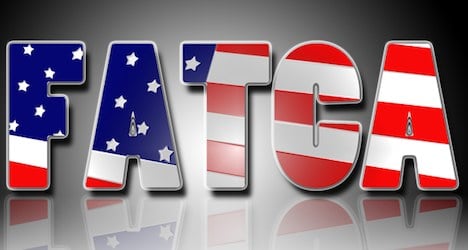Last year, the Swiss bank where he held an account for nine years informed him he should take his business elsewhere. Faced with onerous US tax reporting rules set to come into effect in 2014, the bank decided the costs were too great and that cutting ties with Bloomfield and other American customers would be preferable.
They weren’t the only ones coming to this conclusion, Bloomfield learned when he was rejected by another Swiss cantonal bank. “When the fellow heard my name, he said no chance,” Bloomfield tells The Local. “He was very nice. He simply said it’s too complicated, costs too much money, we don’t want to take that risk.” Bloomfield eventually moved his account to the Raiffeisen bank, where he already had a mortgage.
Many Americans in Switzerland, like Bloomfield, are finding the welcome mat gone from the doorstep of their local bank. Some banks are closing the accounts of Americans who live in Switzerland, while others are refusing to grant them mortgages or loans.
Swiss banks have come under intense scrutiny by the US government in recent years amid its worldwide crackdown on tax avoidance and banking secrecy. Banking giant UBS was slapped with a $780-million fine by US authorities in 2009, while the country’s oldest bank Wegelin & Co. closed its doors after pleading guilty this year in a US court to helping rich Americans avoid paying their taxes.
Already battle-scarred from the hard lessons of recent years, Swiss banks are taking a very cautious approach when it comes to the introduction of the Foreign Account Tax Compliance Act (FATCA). The US law requires banks around the world to report information on American account holders to Uncle Sam. Failure to comply will result in significant financial penalties in the form of 30 percent withholding taxes.
“For American citizens abroad, life is going to get even tougher,” Martin Naville, chief executive officer of the Swiss-American Chamber of Commerce candidly tells The Local. “For US persons living here, there are still solutions but it’s very, very complex,” Naville says. “For most of the banks, the easiest thing to be FATCA compliant is to just send a letter to the IRS once a year saying we have no US persons here. Any US person gives you additional work.”
These actions are forcing some Americans in Switzerland to make difficult decisions, including giving up their US passport. Bloomfield’s experience with his bank, for example, made him nervous about further financial uncertainty down the road as a result of his American passport. “I need to have a bank account in Switzerland,” he says. “I don’t want to be surprised by a bank saying you need pay up your mortgage within six months.” Last October, Bloomfield went to the US embassy to renounce his American citizenship. He has held a Swiss passport since 2007.
“After 30-some years, I guess I’m more at home here than in the United States,” Bloomfield says. “Of course you can never crawl out of your skin . . . my American heritage I didn’t give up at the embassy.”
He’s not the only one choosing this route: 411 Americans in Switzerland gave up their US citizenship in the first nine months of 2012, compared with 180 in 2011, according to a report last year from swissinfo.
Fellow American Jackie Bugnion, who has lived in Switzerland for 48 years, say FATCA is hitting American expats hard. As a director for Americans Citizens Abroad (ACA), she is helping lead the charge to repeal the legislation. FATCA is leading to conflict and uncertainty between some American-Swiss couples, for example, as the Swiss spouses don’t want to give the IRS access to their financial records, Bugnion tells The Local. She says that one woman said she was on the verge of divorce as a result of the tax changes.
ACA is working on a residence-based taxation proposal to tax Americans abroad in the same manner as non-resident foreign nationals, eliminating the need for banks abroad to treat these expats as American citizens, she explains.
“It’s very stressful for the American community overseas,” says Bugnion, who herself has had two investment accounts closed with Swiss banks. She calls FATCA “the straw that has broken the camel’s back".
“There are a lot of people out there panicked.”
There are also concerns that FATCA’s collateral damage could extend beyond the home front into the business world. If an American owns more than ten percent of a company, it is reportable to the IRS. The worry is that this rule may make it harder for US entrepreneurs to find business and banking partners, shutting them out of attractive investment opportunities.
This is a concern for Ron Banks, an executive committee member of the American International Club of Geneva who has lived in Switzerland for 18 years. An entrepreneur, he believes FATCA could have far-reaching implications, making it more difficult to set up a company and to do business. “Americans are being kicked out of partnerships because the European partners don’t want Uncle Sam looking at their books,” says Banks, who is also vice executive director at ACA.
Despite the banking problems, Americans say Swiss are sympathetic to their woes with the taxman. Indeed, if FATCA kindles anti-American feelings at all, its is from US citizens living around the world. Bugnion says normally the American community overseas are the “best ambassadors” for the US. But when expats feel like they’re being flattened by a “steamroller”, she says, they’re not being so diplomatic about their home country. “That’s very, very bad for the United States.”


 Please whitelist us to continue reading.
Please whitelist us to continue reading.
Member comments